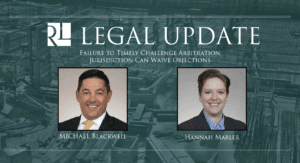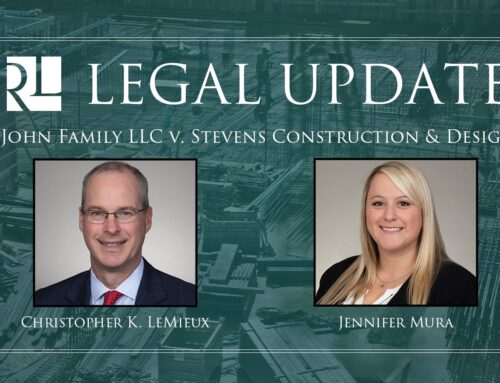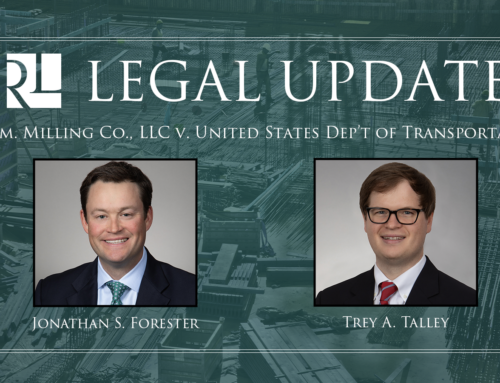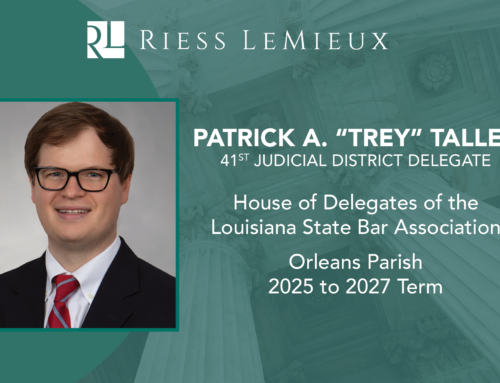 JMA Painters, LLC v. The McDonnel Group, LLC and Travelers Casualty and Surety Company of America, 2023 WL 4530114 (La. App. 4 Cir. 7/13/2023)
JMA Painters, LLC v. The McDonnel Group, LLC and Travelers Casualty and Surety Company of America, 2023 WL 4530114 (La. App. 4 Cir. 7/13/2023)
Failure to Timely Challenge Arbitration Jurisdiction Can Waive Objections
Authors: Michael S. Blackwell and Hannah M. Marler
The Fourth Circuit in JMA Painters, LLC v. McDonnel Group, LLC et al, upheld an arbitration award because the complainants waived their right to object to the timeliness of the arbitration award.
This case involved an arbitration dispute between a subcontractor JMA Painters, LLC (“JMA”) and the general contractor, The McDonnel Group, LLC (“TMG”), and TMG’s surety, Travelers Casualty and Surety Company of America (“Travelers”). TMG entered into a subcontract with JMA that contained a provision requiring arbitration for any dispute asserted by the projects’ owner where a subcontractor’s work was at issue in the owner’s claim. The subcontract further required arbitration for any disputes arising out of the subcontract itself. All arbitration was to be conducted in accordance with the Construction Industry Arbitration Rules of the American Arbitration Association (“AAA”).
JMA filed a demand for arbitration against TMG and Travelers for uncompensated work under the Louisiana Private Works Act. The evidentiary hearing was held from June 4, 2021, through June 7, 2021, before a panel of three arbitrators. On October 8, 2021, the panel of arbitrators informed the parties that the panel’s chairman needed to resign due to health issues, but the parties agreed on October 18, 2021, to submit the matter to the two remaining arbitrators. On February 8, 2022, the arbitrators rendered an Interim Award in favor of JMA, which included damages associated with uncompensated work as well as reasonable attorney’s fees, cost, and interest from the date of judicial demand. On March 18, 2022, the arbitrators entered an Order awarding JMA attorney and costs, which contained a clerical error. However, on March 24, 2022, the arbitrators entered a Final Award, correcting clerical errors and finalizing the amount of cost to be paid.
On April 22, 2022, JMA filed a petition in the Orleans Parish Civil District Court to confirm the arbitration award, and TMG and Travelers filed a motion to vacate the award. TMG and Travelers argued that the arbitration award was null because the panel was divested of its authority three months after the matter was submitted to the panel. The district court ultimately confirmed the arbitration award, which was the primary issue on appeal.
In rendering its opinion, the Fourth Circuit compared the time-period requirements under Louisiana law and under the AAA Rules. Under La. C.C. art. 3105, “[i]f the submission does not limit any time, the power of the arbitrators may continue in force during three months from the date of the submission, unless the parties agree to revoke it.” The AAA Rules enforce an even shorter period for arbitrator authority, thirty (30) days, under AAA Rule R-46. The Fourth Circuit recognized that the AAA Rules, which were in effect pursuant to the subcontract, permit parties to waive the 30-day time limit. In considering the facts and circumstances surrounding the objection by TMG and Travelers, the Fourth Circuit opined that TMG and Travelers agreed to submit the matter to the panel of two arbitrators on October 18, 2021, more than three months after the submission date. TMG and Travelers further failed to lodge any objection to the arbitration award at the time of the Interim Award, Order, or Final Award. Instead, TMG and Travelers only objected after JMA filed to confirm the award through the Court. For these reasons, the Fourth Circuit held that TMG and Travelers waived the time period set forth under the AAA Rules, which were in effect under the subcontract.
Case law in this area has been particularly sparse. This new ruling from the Fourth Circuit provides critical guidance on the time period for objecting to any jurisdictional limitations an arbitration panel has, and highlights the importance of knowing the applicable time periods for asserting the objection, whether under Louisiana law or the AAA Rules.



